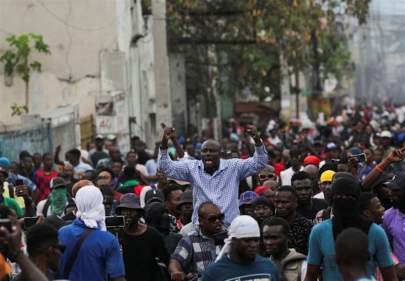Haiti declares state of emergency after thousands of dangerous inmates escape.
Monday, March 4, 2024
Source: The Guardian
Sam Jones and agencies
Mon 4 Mar 2024 12.29 EST

Haiti has declared a three-day state of emergency and a night-time curfew after armed gangs stormed the country’s two biggest jails, allowing more than 3,000 dangerous criminals, including murderers and kidnappers, to escape back onto the streets of the poor and violence-racked Caribbean nation.
The finance minister, Patrick Boisvert – who is in charge while the embattled prime minister, Ariel Henry, is abroad trying to salvage support for a UN-backed security force to stabilize Haiti – said police would use “all legal means at their disposal” to recapture the prisoners and enforce the curfew.
Jimmy Chérizier, a former elite police officer known as Barbecue who now runs a gang federation, has claimed responsibility for the surge in attacks. He said the goal was to capture Haiti’s police chief and government ministers and prevent Henry’s return.
The emergency decree was issued after a deadly weekend that marked a new low in Haiti’s spiral of violence, and which has led the US to advise its citizens to leave “as soon as possible” and Canada to temporarily close its embassy.
At least nine people have been killed since Thursday, among them four police officers. Targets have included police stations, the country’s international airport and the national football stadium, where one employee was held hostage for hours.
The UN estimates that about 15,000 people were forced to flee the violence between Thursday and Saturday, including those already in makeshift camps for displaced people set up in schools, hospitals and squares around the capital, Port-au-Prince.
But even in a country accustomed to the constant threat of violence, Saturday’s attack on the national penitentiary in Port-au-Prince came as a huge shock.
Almost all of the estimated 4,000 inmates escaped, leaving the normally overcrowded prison eerily empty on Sunday with no guards in sight and plastic sandals, clothing and furniture strewn across the concrete patio. Three bodies with gunshot wounds lay at the prison entrance.
In another neighborhood, the bloodied corpses of two men with their hands tied behind their backs lay face down as residents walked past roadblocks set up with burning tires.
A middle-aged man surrounded by masked gunmen stares into the camera. Haiti’s most powerful gang boss calls for uprising to overthrow prime minister
It was unclear how many inmates were on the run, but Arnel Remy, a human rights lawyer whose non-profit organization works inside the national penitentiary, said on X that fewer than 100 of the nearly 4,000 inmates remained behind bars.
“I’m the only one left in my cell,” one unidentified inmate told Reuters. Sources close to the institution said it was likely an “overwhelming” majority of inmates had escaped. The penitentiary, built to hold 700 prisoners, held 3,687 as of February last year, according to rights group RNDDH.
The BBC cited a local journalist who said the vast majority of about 4,000 men held there had escaped.
Those choosing to stay included 18 former Colombian soldiers accused of working as mercenaries in the July 2021 assassination of the then Haitian president, Jovenel Moïse. On Saturday night, several of the Colombians shared a video pleading for their lives.
“Please, please help us,” one of the men, Francisco Uribe, said in the message widely shared on social media. “They are massacring people indiscriminately inside the cells.”
A second Port-au-Prince prison containing about 1,400 inmates was also overrun.
The violence on Saturday night appeared to be widespread, with several neighborhoods reporting gunfire.
Internet service for many residents was also down as Haiti’s top mobile network said a fibre optic cable connection was slashed during the rampage. Field teams managed to fully restore the connection on Sunday afternoon.
In the space of less than two weeks, several state institutions have been attacked by the gangs, who are increasingly coordinating their actions and choosing once unthinkable targets such as the central bank.
Henry took over as prime minister after Moise’s assassination and has repeatedly postponed plans to hold parliamentary and presidential elections, which have not taken place in almost a decade.
The prime minister, a neurosurgeon, signed reciprocal agreements last week with Kenya’s president, William Ruto, in an effort to salvage the plan to deploy Kenyan police to Haiti.
In January, Kenya’s high court ruled that the deployment was unconstitutional, in part because the original deal lacked reciprocal agreements between the two countries. Henry has shrugged off calls for his resignation and did not comment when asked if he felt it was safe to come home.
Haiti’s national police have roughly 9,000 officers to provide security for more than 11 million people, according to the UN. They are routinely overwhelmed and outgunned by gangs, which are estimated to control up to 80% of the capital.
After gangs opened fire at Haiti’s international airport last week, the US embassy said it was halting all official travel to the country. On Sunday night, it urged all American citizens to depart as soon as possible.
The Biden administration – which has offered Haiti money and logistical support but steadfastly refused to commit troops to any multinational force – said it was monitoring the rapidly deteriorating security situation with grave concern.
Stéphane Dujarric, a UN spokesperson, said the latest upsurge in violence underlined the need for member nations to work quickly to support and deploy the multinational security force.
“We have been talking for months now about how civilians in Haiti and in Port-au-Prince are basically trapped by gang violence,” he told reporters at UN headquarters in New York. “Schools are closed, hospitals are not functioning, people are suffering on a daily basis.”
Earlier this year, the UN said that more than 300,000 people had fled their homes due to the worsening gang conflict, which claimed almost 5,000 lives last year.
The Associated Press and Reuters contributed to this report











